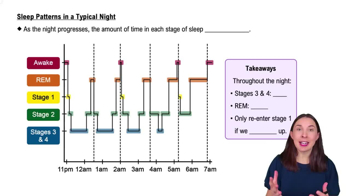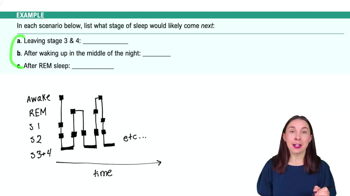Table of contents
- 1. Introduction to Psychology1h 43m
- 2. Psychology Research2h 20m
- 3. Biological Psychology2h 41m
- 4. Sensation and Perception28m
- 5. Consciousness and Sleep32m
- 6. Learning41m
- 7. Memory34m
- 8. Cognition37m
- 9. Emotion and Motivation35m
- 10. Developmental Psychology33m
- 11. Personality48m
- 12. Social Psychology41m
- 13. Stress and Health41m
- 14. Psychological Disorders44m
- 15. Treatment47m
5. Consciousness and Sleep
Sleep
Struggling with Psychology?
Join thousands of students who trust us to help them ace their exams!Watch the first videoMultiple Choice
One role of the ventromedial hypothalamus may be to
A
release the hormone leptin when blood sugar levels are stabilized.
B
regulate the basal metabolic rate to control weight set point.
C
stop the eating response when glucose levels go up.
D
influence the onset of eating when insulin levels go up.
 Verified step by step guidance
Verified step by step guidance1
Begin by understanding the function of the ventromedial hypothalamus (VMH) in the brain. The VMH is involved in regulating hunger and satiety signals.
Consider the role of glucose levels in the body. When glucose levels rise, it typically signals that the body has received enough energy from food, which can trigger satiety signals.
Explore how the VMH interacts with glucose levels. The VMH is known to respond to changes in glucose levels, particularly by stopping the eating response when glucose levels are sufficiently high.
Examine the relationship between insulin levels and eating behavior. Insulin is a hormone that helps regulate blood sugar levels, and its increase can signal the body to start eating.
Conclude by identifying the correct function of the VMH in the context of the given options. The VMH stops the eating response when glucose levels go up, indicating its role in satiety and energy balance.

 3:25m
3:25mWatch next
Master Circadian Rhythms with a bite sized video explanation from Hannah Gordils
Start learningRelated Videos
Related Practice


































































































![Race, Genes and IQ Differences | Bret Weinstein [Mini Clip]](https://img.youtube.com/vi/IztL_m3pd70/mqdefault.jpg)



































































































